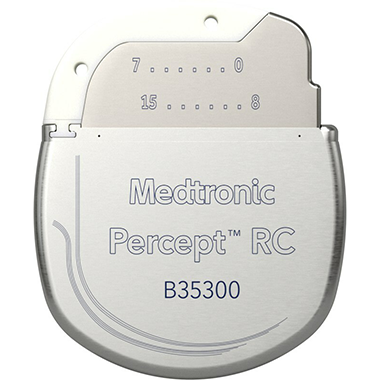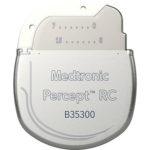The FDA has approved Medtronic’s Percept RC Deep Brain Stimulation (DBS) system for patients with movement disorders such as Parkinson’s disease, essential tremor, dystonia and epilepsy.
The surgically implanted Medtronic Percept neurostimulators transmit electrical signals via slender wires to specific brain targets affected by neurological disorders to control tremors. The Percept RC is the smallest and thinnest dual channel neurostimulator currently available for DBS. It is equipped with BrainSense technology that captures and records brain signals to provide insights that enable a healthcare provider to adapt and personalize therapy to a patient’s evolving needs. The Percept RC battery offers at least 15 years of service life with rapid recharging from 10% to 90% full charge in less than an hour.
“While more data are needed, the sensing capability of this unique deep brain stimulation system allows me the potential to tune stimulation delivery to brain activity, which may be a way to personalize this therapy for Parkinson’s disease in the future,” said Casey H. Halpern, M.D., Neurosurgeon and deep brain stimulation expert.
Medtronic’ DBS system allows patients to have stimulation on in bipolar mode during an MRI. In addition, the Percept neurostimulators are engineered to allow for future software updates designed for the Percept platform without a neurostimulator device exchange.
“This new rechargeable neurostimulator technology provides me with insights into my patients’ symptoms and can capture data even when they’re outside of the clinic,” said Eleni Okeanis Vaou, M.D., FAAN, associate professor of neurology. “Now I have a rechargeable DBS therapy option with sensing technology allowing me to track a patient’s response to DBS and medications. I use this data to inform how to personalize and optimize patient therapy.”







